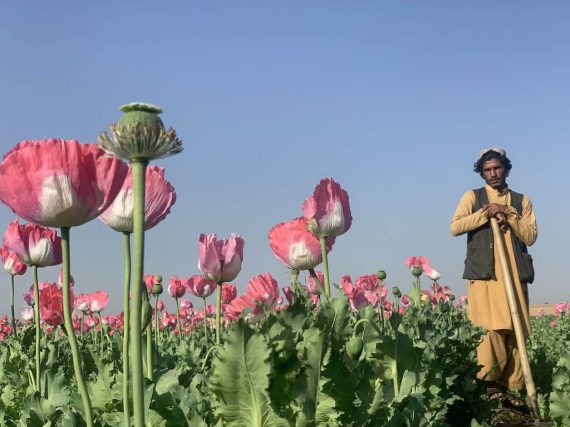On Saturday, April 2, Taliban spokesperson Zabihullah Mujahid announced a ban on opium cultivation, opium use, and trade, and warned that crops would be destroyed, and perpetrators would be punished according to Sharia law. The new ban also covers illicit drugs and alcohol.
Afghanistan is the world’s largest opium poppy cultivator, and a significant portion of its GDP relies on the crop. Throughout the years of instability and war in the country, the numbers of opium poppy farmers reached millions.
The ban, taking place amidst the free fall of Afghanistan’s economy and cash shortage, sparks fears of livelihood and food insecurity. At the same time, the decision was met with praise from the international community which demanded drug control from the Taliban. Since their takeover, the group had been trying to amend its image in the hope of earning international recognition and the easing of sanctions.
Afghanistan’s rocky road with opium
Since the 1990s, Afghanistan became the world’s largest producer of opium. The trend started in the 1980s due to political, geo-strategic, and economic factors—mainly the lack of effective governance, and deterioration of the economic and agricultural infrastructure due to the civil war. Thus, the rural farming of opium poppies became a viable livelihood option.
Prior to the civil war that started in 1979, the Afghani government had already been struggling with the enforcement of opium production bans due to an unavailability of resources. Like other conflicts, illicit drug production and trade became a lucrative option for the fighting groups to fund arms when the war started.
After the Soviet Union withdrew from Afghanistan in the 1990s, the Taliban took control of most parts of the country. Most of the patronage of the fighting factions’ financial resources dried up leading them to turn to opium cultivation. There were insufficient resources for agricultural products like wheat accompanied by lack of coordination for existing resources.
Moreover, agricultural taxes including income from opium poppies were collected by mullahs and local authorities throughout the fighting period before the Taliban took control, which signaled a greenl ight for cultivation. When the Taliban took control, they banned the drug trade in 1994. The group made an attempt to end poppy cultivation by imposing restrictions rather than a full ban; however, in 1996, taxes similar to the ones formerly paid to mullahs where imposed on farmers and traffickers of opium. The production and consumption of opiate drugs were banned, but trade and heroin labs still remained.
The Taliban ordered farmers to reduce their opium poppy crops by one third in 1999, and in 2000, imposed a total ban on religious grounds, which was successfully enforced. Yet, the ban was short-lasting due to the U.S. invasion that toppled the Taliban in 2001. With ongoing instability and Taliban insurgency, opium production increased remarkably reaching its first peak in 2007. Despite their earlier ban, the Taliban partially funded their activities with opium trade that generated revenue of around $460 million in 2020, according to the UN.
Economic collapse after Taliban takeover
When the U.S. completed its withdrawal from Afghanistan, the Taliban took over the capital Kabul in August 2021 resulting in the pulling of international funds from Afghanistan—funds on which the country was heavily dependent and which covered the majority of basic public services such as education, healthcare, food assistance, energy, shelter, and sanitation.
Sanctions were imposed on Afghanistan and the country’s assets abroad, worth $9.5 billion, were frozen as the international community was unwilling to recognize the Taliban’s rule. This caused the government services and jobs in the public and private sectors to collapse, further contributing to the downfall of the Afghani economy. The UN had warned of an economic collapse even before the Taliban takeover.
What is more, the Taliban ascent to power caused the civil servants and skilled professionals to flee the country while economic collapse starved those who remain. Salaries are no longer paid as cash shortages prevail and finding employment is increasingly difficult. Meanwhile, food prices have skyrocketed, and Afghanistan endured one of its worst droughts in 2021.
Food insecurity in rural areas is aggravated and similar settings are increasingly visible in urban areas where the middle class resides, many resorting to selling their belongings to buy food. According to the UN, around 23 million people acutely struggle with food shortages in Afghanistan.
In December 2021, Filippo Grandi, the UN high commissioner for refugees, alerted of the risk of increased migration and called for economic aid. Later that month, the UN Security Council adopted a resolution to make an exception on UN sanctions on humanitarian grounds if provided directly, bypassing the Taliban. The Taliban government has mainly been compliant, allowing the direct provision of aid.
Recommended
Opium ban comes during harvest season, alternative plan yet to be made
Recently, opium cultivation in Afghanistan saw a surge with farmers seeking alleviation from the country’s dire economic situation. Opium products generate at least $1.8 billion in Afghanistan annually. The Taliban’s strategy regarding income alternatives to the lucrative crop is still uncertain. TOLO news, a local Afghani news outlet, reported that Deputy Prime Minister Abdul Salam Hanafi asked international donors for cooperation to help find alternative businesses for farmers and treat drug addicts.
Ian McCary, the chief of mission for U.S. Embassy Kabul (currently based on Doha), praised the move in a tweet and pointed out that enforcement would be key for the positive outcome of a thriving licit agricultural sector. It is yet to be seen if drug control and an attempt at building a more temperate image will ease international sanctions for the Taliban or even contribute towards an official recognition by the international community.





